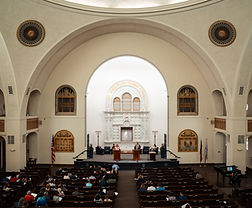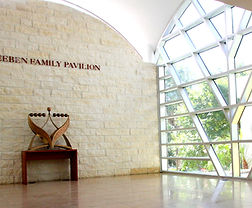
About Us
Temple Beth-El is a safe, welcoming, inclusive, and diverse sacred community where individuals and families of all backgrounds can find belonging, meaning, and connection.
For 150 years, our clergy and members have helped shape the cultural and civic life of San Antonio, while building a strong foundation for Reform Judaism in South Texas. As the largest Reform congregation in the region, Temple Beth-El is proud to be home to more than 800 households and continues to grow as a center of Jewish life.
Under the leadership of Senior Rabbi Mara Nathan (since 2014), Associate Rabbi Marina Yergin (since 2015), and Cantor Seth Ettinger (since 2024) Temple Beth-El remains rooted in tradition while embracing the needs and values of today’s world.
b’tzelem Elohim
בצלם אלוהים
Temple Beth-El firmly believes in the Jewish value of b’tzelem Elohim, that we are all created in God’s image.
Our History
Temple Beth-El was founded in 1874 by a small group of German Jewish immigrants who sought to build a Jewish spiritual home in San Antonio. As one of the oldest Reform congregations in Texas, Temple Beth-El quickly became a cornerstone of Jewish life in the region. Services were originally held in homes and rented spaces before the congregation built its first permanent synagogue in 1875. From its earliest days, Temple Beth-El reflected the values of Reform Judaism—emphasizing inclusivity, ethical living, and a strong connection to both Jewish tradition and modern life.
Throughout the 20th century, Temple Beth-El played a vital role in shaping San Antonio’s civic and cultural identity. As the city grew, so too did the congregation - the old structure was dismantled to make way for the new one, which would be built on the same site. The clergy and members of Temple Beth-El were active in the broader community, advocating for education, civil rights, and interfaith cooperation, solidifying the Temple’s reputation as a leader in both Jewish and public life.
In 1927, the congregation moved to its current location at the corner of San Pedro and Ashby, just north of downtown San Antonio. This modern facility was designed to meet the needs of a growing and evolving Jewish community, with spacious sanctuaries, classrooms, social halls, and administrative spaces. The move marked a new chapter in history—one of continued growth, innovation, and engagement. The Temple embraced new worship styles, launched dynamic educational programs, and created new opportunities for spiritual, cultural, and social connection.
As Temple Beth-El celebrated its 150th anniversary last year, we reflected on a proud legacy that serves as a living bridge between our rich history and a vibrant future. We remain forward-looking—welcoming new members, embracing innovation, and responding to the evolving needs of the Jewish community and the broader San Antonio region. With a strong foundation and a bold vision, Temple Beth-El continues to thrive as a dynamic and enduring presence in Reform Jewish life in South Texas.
Our Temple
Temple Beth-El was designed to serve a growing and dynamic congregation. Our facility features a beautiful sanctuary with sweeping stained-glass windows, a welcoming chapel, spacious classrooms, and gathering spaces for learning, celebration, and community connection. Its modern architecture blends functionality with warmth, creating a sacred space that reflects the spirit and values of Reform Judaism while supporting our diverse needs.

Wulfe Sanctuary
Our sanctuary is a beautiful and serene space, centered around a striking marble archway and vibrant stained-glass windows that fill the room with color and light. It is the heart of our congregation, where we host our worship services and gather for community.

Oppenheimer Chapel
The Oppenheimer Chapel is an intimate space, ideal for smaller worship services, life cycle events, and quiet reflection. With its warm wood finishes and stained glass, the chapel offers a peaceful atmosphere for prayer in a more personal setting.

Dreeben Family Pavillion
The Dreeben Family Pavilion is a spacious and versatile gathering area used for celebrations, receptions, and programs. With its high ceilings, natural light, and flexible layout, it serves as a vibrant hub for social connection and congregational life at Temple Beth-El.
Code of Ethics
.png)
Exemplify Holiness | K’dushah
We welcome all who wish to engage with our sacred community and strive to help all feel a sense of belonging without regard to religious background, age, ability, race, ethnicity, nationality, gender, gender identity, sexual orientation, marital status, or socioeconomic status.
Honesty | Yosher
All who engage in our community are expected to conduct themselves in an honest manner, which includes maintaining confidentialities, protecting intellectual property rights, being appropriately transparent with information, and refraining from speculation about personal situations.
Honor | Kavod
Integrity matters. We behave in ways that maintain a positive reputation, both as individuals and as ambassadors of the congregation.
Compassion | Rachamim
We embrace the fundamental value of performing acts of loving kindness (g’milut chasadim). We treat others with respect, dignity, and fairness, while actively opposing bullying and any behavior that degrades, humiliates, or oppresses another person.
Justice | Tzedek
Everyone entering our sacred space has the right to feel safe and respected. As we are morally and ethically responsible for one another, we do not tolerate acts or behaviors that exploit the vulnerability of another, take advantage of a power imbalance, compromise one’s moral integrity or create an intimidating, offensive, abusive, or hostile environment.
Support | Hatsilu
A Covenant (brit) exists between our members and future generations to assure the healthy continuation of our congregation. To be good ancestors, we acknowledge our obligation to support our congregation through time, talent, and financial investments.

